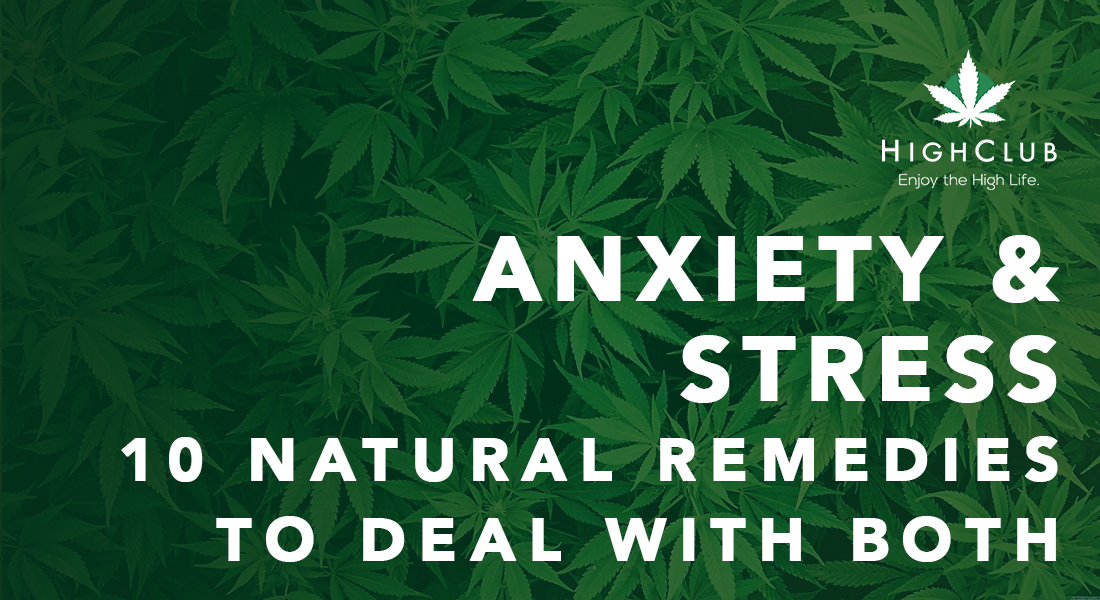Anxiety and stress affect a lot more people than you might think.
In Canada alone, more than 41% of the population struggles from anxiety and only a third of those have gotten an official diagnosis.
Since stress and anxiety are so wide-spread in society, there are have been created many different solutions to treat it. However, these remedies are usually costly and mostly come with undesirable side-effects. Since most people want to avoid the expensive drugs and their side-effects, natural remedies are becoming increasingly popular.
There are many different types of anxiety disorders, including social anxiety, OCD, PTSD, panic disorder and generalized anxiety disorder. All these affect people in different ways and unfortunately restrict them from performing their duties or running their day-to-day lives. If you have ever struggled with anxiety or stress and their resultant effects, you have now come to the right place. There are tons of natural remedies that are less costly, user-friendly, and without any negative side-effects.
What’s more, these remedies are also known for doing the job. The beauty of these remedies is that some do not need you to visit a health centre; you can easily do it at home.
The following ten natural remedies will help you relieve the effects of stress and anxiety:
1. Use Marijuana
To many people, marijuana is the herb that has a bad rap. To this group of people, it’s a surprise that weed can actually be used to treat the symptom s of anxiety and stress. And this is not just pep talk; research shows that a small amount of weed actually relieves stress and depression (Although we must stress to limit yourself to a small amount based on your tolerance level).
Unlike most traditional remedies, marijuana is extracted from a plant. The cannabis plant produces many cannabinoids that give a relaxing feel when they come into contact with your body. Most people use marijuana to treat conditions such as chronic pain, migraines, and cancer.
According to a 2018 study, weed actually relieves the effects of anxiety and stress. If you can’t stand smoking a whole joint at a go, you don’t need to worry as just a small puff can do wonders, or even indulging a small dose of edibles.
2. Use CBD Products
If smoking marijuana is not something you fancy doing, then there’s a way you can get the same benefits of weed without getting high; CBD. CBD is a cannabinoid that’s found in both the cannabis and hemp plants. Unlike THC, CBD is not psychoactive, so you won’t need to worry about the side effects of marijuana.
According to a study on CBD, taking just a few drops of CBD on a daily basis can relieve the effects of stress and anxiety. In the study, subjects who used 25 mg of CBD on a daily basis ended up with better sleep. A third study showed that subjects who took 600 mg of CBD at once reported that they felt relief from anxiety within an hour.
With CBD, you’ll be spoilt for choice when it comes to finding the product that fits your needs. One of the most common CBD products is tinctures, which are applied below the tongue. Their effects kick in within 20-30 minutes. Other options are disposable CBD vapes or even cookies made with CBD.
3. Exercise Regularly
Working out has become the number one way of relieving stress and anxiety. According to ADAA, exercising helps your body to release endorphins, which relieve stress and anxiety.
Working out has so many benefits that doctors recommend it over medicine. Some of these benefits include; reduced blood pressure and improved sleep. Overall, exercising helps you to boost your confidence levels and to feel happier, effectively slowing down the effects of stress and anxiety.
The best part is you don’t need to sweat for hours in the name of exercising. In fact, according to the Center for Disease Control and Prevention, 30 minutes of moderate to high-intensity workouts are enough to relieve stress and anxiety when done five days a week. As such, even people with busy schedules are able to exercise regularly.
Exercising also takes many forms. For instance, you can grab the bicycle to work, go for a run, do yoga in the morning or just hit the gym. Whichever workout method you choose, you know that it is a natural one that keeps stress and anxiety at bay.
4. Get More Sleep
Who would have guessed? A good night’s sleep will help you beat stress and anxiety. Without enough sleep, you are vulnerable to getting easily stressed, or cranky and fatigued. Poor sleep leads to anxiety and anxiety gives you sleepless nights.
But just how much sleep is enough? According to one study, eight hours of sleep are enough to keep you well-nourished and stress-free. Anything less than that will be exposing you to the risk of stress and anxiety.
There are many ways that you can ease yourself into sleeping, including having a fixed, regular sleep schedule. This kind of schedule reminds your body to shut off at the right time. The only thing you should avoid before going to sleep is screens, whether from laptops or from phones.
If you’re lucky to get eight hours of sleep every day, you will realize that you wake up a happier person.
5. Start Meditating
Meditating entails clearing your mind and bringing about a calm, positive mental state. It’s beneficial to our health, although many people do not seem to believe that it actually works. If you never tried meditating before, it’s about time you gave it a try.
According to a study, mindfulness meditation reduces stress and anxiety levels significantly, even when done for only one hour. Even 10 to 15 minutes of mindfulness meditation at home does clear your mind of clutter. All you need is to look up some online tutorials or YouTube videos to learn more about it and how to control your breathing, induce a positive mind and eliminate negative thoughts.
6. Drink Herbal Teas
When it comes to anxiety, some drinks can really accelerate your level of anxiety. These include drinks that are high in caffeine as well as sugary drinks. It’s best to avoid cappuccino and frappes. However, some drinks like herbal teas seem to help with anxiety.
According to a 2016 study, Chamomile tea seems to reduce the symptoms of anxiety, when taken over a long period. Another kind of herbal tea found to be effective in relieving the symptoms of anxiety is ashwagandha root tea. According to studies, it reduces the symptoms of anxiety by up to 44%.
However, Green Tea takes the crown. According to research, green tea improves brain function, while soothing your anxiety.
7. Spend Time Outdoors
Did you know that you could reduce your anxiety levels by just spending time in the sun? Spending time outdoors seems to relieve the symptoms of anxiety. On the flip side, staying indoors for long tends to expose you to the risk of getting anxious. Whether you’re at home or in the office, spending some time outdoors can greatly improve your moods.
Research conducted by the University of East Anglia shows that when you are exposed to green spaces, you could cut the level of stress by a wide margin. It also showed that staying outdoors reduces the risk of getting cardiovascular diseases, lowers blood pressure and reduces the risk of diabetes.
If you feel like you’re not spending any time outside in the sun, it’s time to start enjoying its benefits. Without the sunlight, your Vitamin D levels decrease, leading to depression and anxiety. So, why not jump outside to improve your mood and health?
8. Get a Pet
Pet therapy, or the act of having a pet by your side, seems to be getting increasingly popular in the recent past. Spending time with a pet is likely to uplift your moods and improve your mental health. Petting a cat, dog or any other animal is likely to make you happier and motivated.
If having to own a cat or dog is not something that you think you will be able to do, there are many pet therapy centres where you can play with pets in order to improve your moods. Maybe it wouldn’t be too bad to try out one of these?
9. Change Your Diet
What you eat matters when it comes to mental wellness. Certain foods tend to make us feel fatigued, some increase our blood pressure and others worsen our anxiety levels.
A clean diet is recommended if you have anxiety disorders. One of the foods that you should immediately cut from your diets is junk foods, especially ones with saturated fats and sugars. These tend to increase your cholesterol levels as well as your blood pressure while spiking your anxiety levels.
Lean meats, vegetables, nuts, and whole grains have been found to lessen the level of anxiety. They have high nutritional benefits, as they also keep your health in check.
10. Check Your Vitamin Intake
Vitamins are an integral part of any good diet. When you’re looking for ways to reduce your anxiety levels, it’s recommended that you look at your vitamin intake. Vitamin deficiency could worsen your mental and physical health, so it’s always a good thing to make sure you have a healthy intake of crucial vitamins.
Fruits and vegetables are known for having a good dose of vitamins and minerals. If you’re not getting enough of these, you can easily get more vitamins from supplements, which are readily available.
Vitamins are known to help with sleep, to reduce stress levels and to improve general health.

